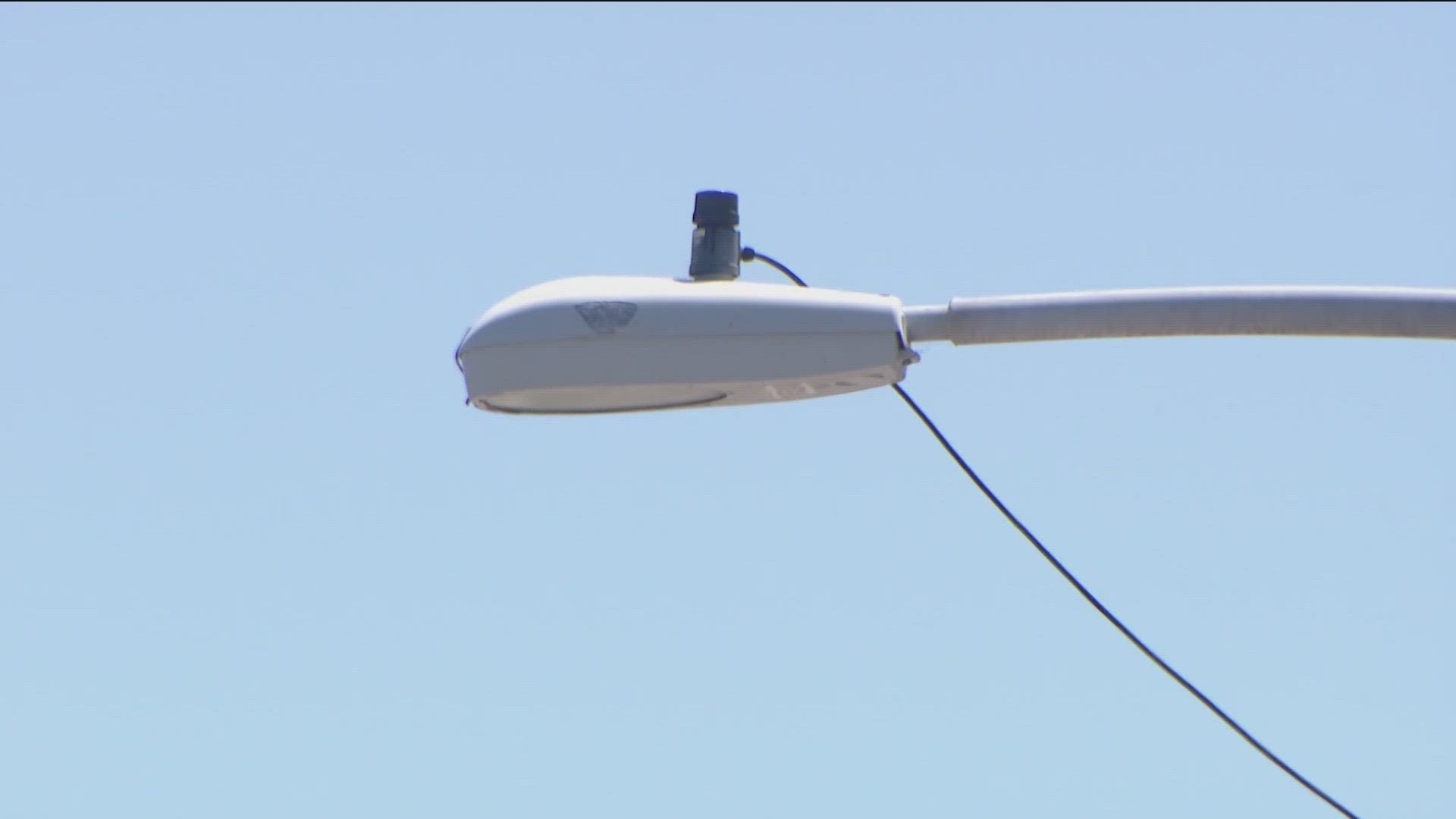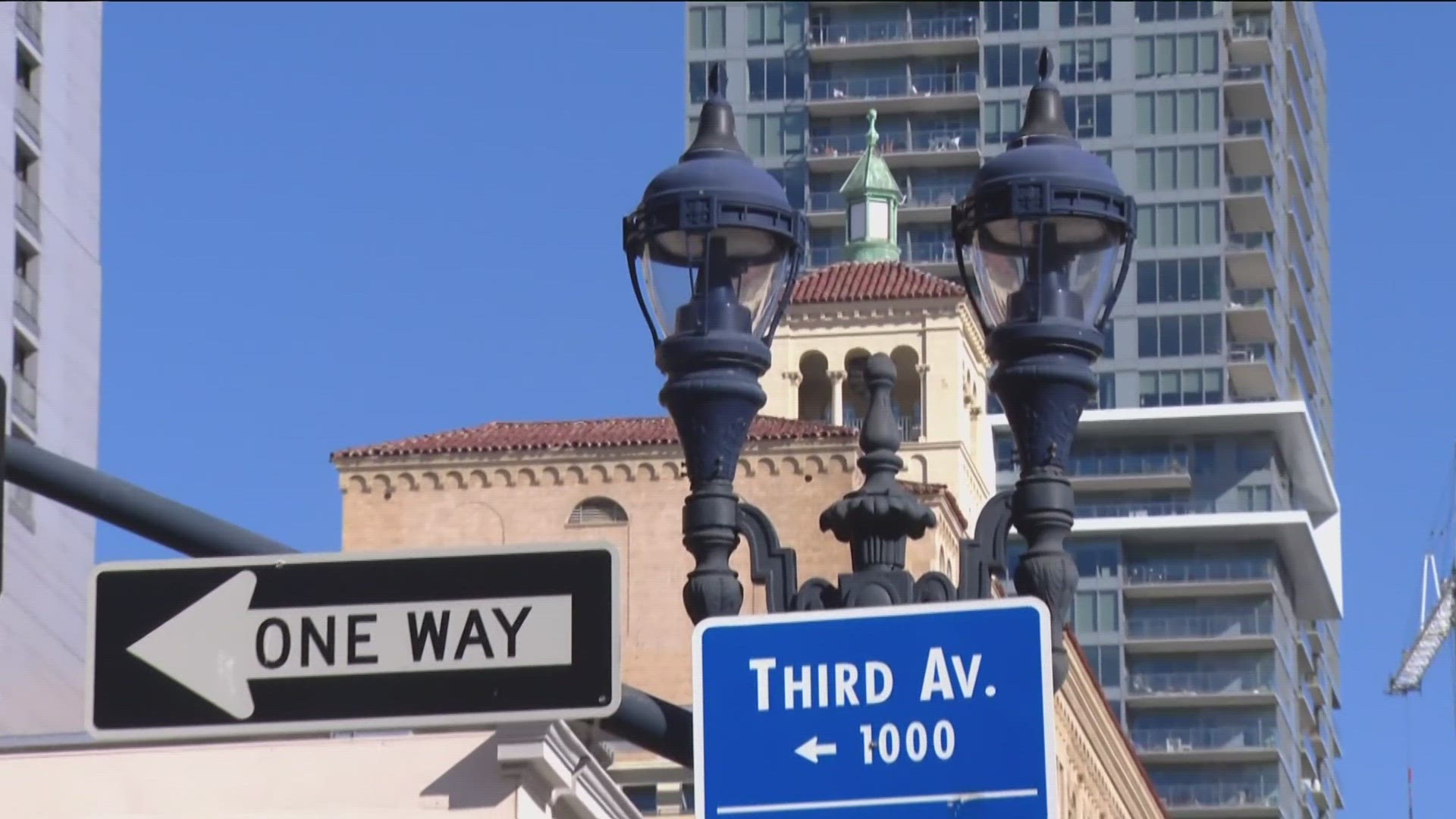SAN DIEGO — UPDATE - July 19: The San Diego City Council Public Safety Committee voted 3-1 to move the smart streetlight proposal forward to the full city council, with Councilmember Monica Montgomery-Steppe voting no. About 60 members of the community voiced their opinions, both for and against, during the public comment period that lasted several hours.
Original story - July 18:
Nearly three years after the city abandoned mass video surveillance from streetlights citywide due to privacy concerns and millions of dollars in cost overruns, the San Diego Police Department is asking for another shot.
On July 19, San Diego's top law enforcement officials will present its latest proposal to a city council committee to install "Smart Streetlights" at 500 locations deemed high crime areas. The devices fastened to streetlights will include video cameras able to capture panoramic views and Automated License Plate Readers (ALPR).
And while the department touts the cameras and license plate readers as an integral tool in fighting and solving violent crime, members of the community where many of the devices will be placed, as well as privacy advocates, say they are being unfairly targeted, spied on, and tracked without their knowledge or permission.
Community members and privacy protectors are not the only groups opposed to San Diego Police Department's plan to restart its streetlight surveillance program.
On June 22, the city's appointed Privacy Advisory Board also rejected the proposal for several reasons, including a lack of transparency into the data collection, uses, and insufficient safeguards, to name a few.
For proponents, the program is a chance to curb what has been said the be a spike in crime and a program that can keep innocent members of the public safe.
Smart Streetlights - Take One
The city of San Diego first installed cameras on streetlights in 2016. The 3,200 cameras, however, were not intended for use as a crime-fighting tool but were meant to monitor traffic and pedestrian movements to help with planning and transportation plans.
However, the Smart Streetlights program received negative criticism after residents and others grew concerned about how the data and videos were shared with third parties, concerns about privacy issues, and a failure to notify communities how the data would be used.
In August 2018, according to a presentation from San Diego Police Captain Jeff Jordon, hours after a murder had occurred in the Gaslamp that homicide detectives looked up and saw the camera on the streetlight and asked to see the footage from it.
"It was jaw-dropping, to say the least, as far as watching a murder on TV," said Captain Jordon during the March 2023 presentation. "It provided great details about what happened that night."
Jordon said the video showed that the man arrested for murder acted in self-defense and was eventually released from jail and not charged with murder.

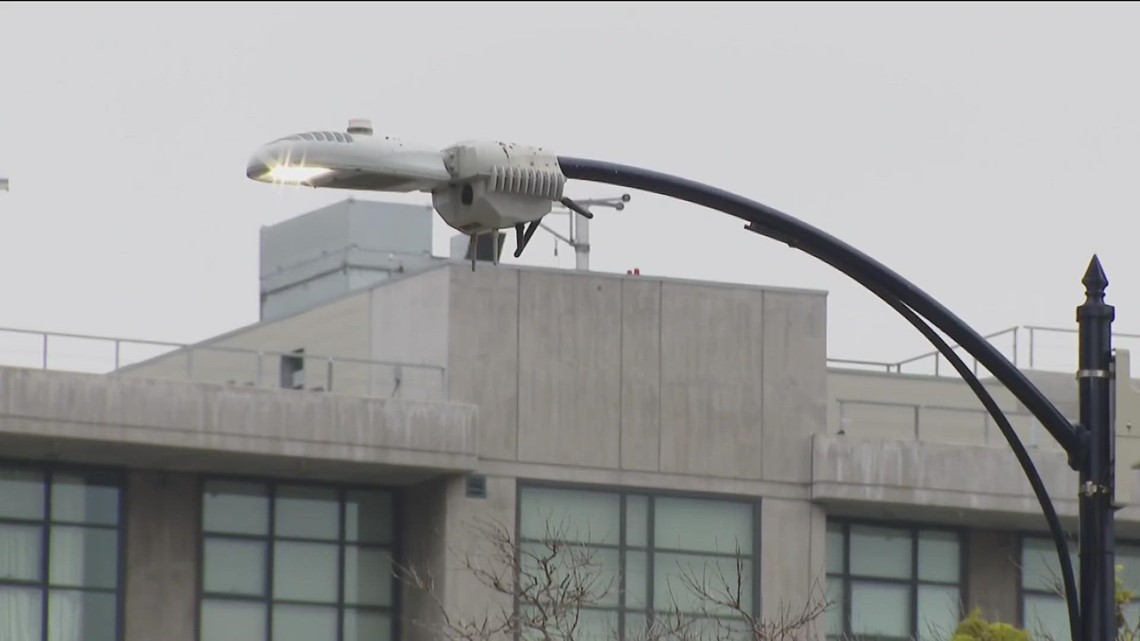
For the next two years, the streetlight cameras morphed from what was meant to be a transportation and planning resource to a crime-fighting surveillance tool. During that time, San Diego police records show that it used smart streetlights to help with criminal investigations in at least 400 instances, including 56 homicide or attempted homicide investigations.
Police say the use of the streetlights helped solve crimes and aided prosecutors during trial.
And while police and law enforcement were utilizing the cameras as a crime-fighting tool, community members in more urban areas objected to the mass surveillance, stating the cameras violated their privacy, targeted minorities, and added to a growing distrust of police in their community.
But privacy concerns and data collection and management were not the only problems with San Diego's Smart Streetlight program. Cost overruns plagued the $30.23 million program. According to an internal memo from then Chief Operating Officer Kris Michell, the city was over $2.3 million over budget due to higher-than-expected energy costs, transmission fees, and data analysis, among other unforeseen expenses.
Even San Diego Police Captain Jeff Jordon, as recently as March of this year, said the city's first go on the smart streetlight program was dimwitted.
"Everybody...from police on down should acknowledge that this was rolled out poorly. If I were going to use Jersey vocabulary, I would use another language," Jordon said.
The poor rollout and pressure from a coalition of community groups, prompted the city to pull the plug on the program.
In April 2022, at the direction of councilmember Monica Montgomery-Steppe, the city formed the Privacy Advisory Board, a committee to review surveillance proposals.
Smart Streetlights and Automated License Plate Readers - Take Two
Early this year, San Diego Police began holding community meetings, a requirement under the new surveillance ordinances, to inform the community of their plans to reboot the Smart Streetlight initiative.
The new program, utterly separate from the initial 19 million dollar program in 2016, calls for the placement of 500 video cameras and 500 Automated License Plate Readers, on streetlights throughout San Diego, with the vast majority in communities south of Interstate 8, in what police say were designated to be high-crime areas.

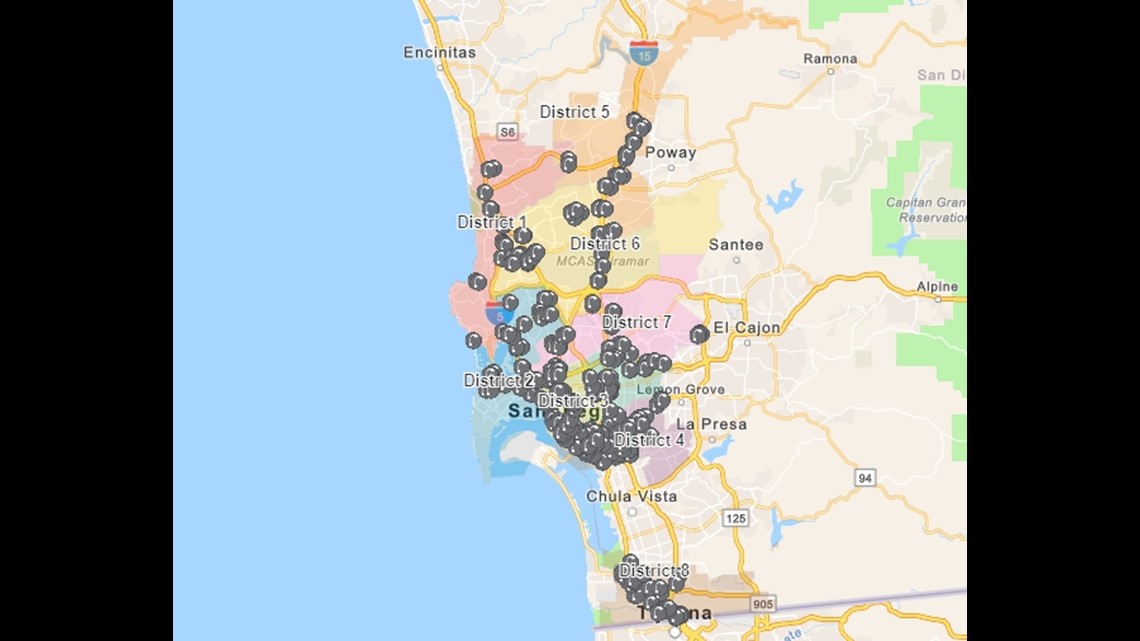
According to the proposal, the cameras placed on the streetlights would include "privacy masking," a measure to "ensure the protection where persons should expect privacy."
In addition, the footage captured from the cameras would be deleted every 15 days and would not utilize facial recognition.

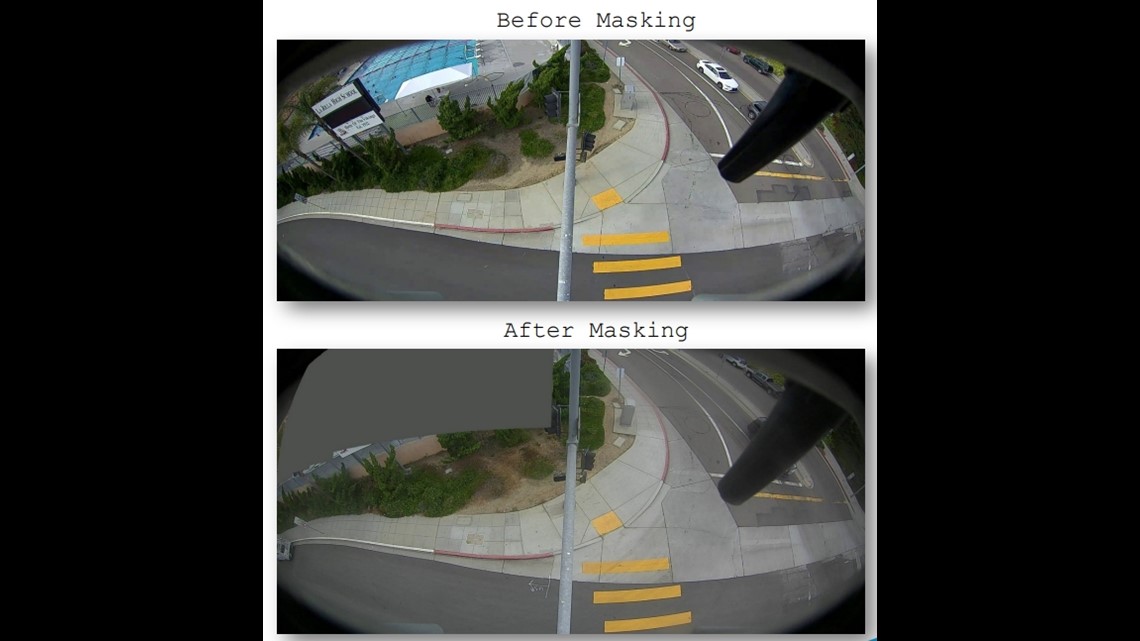
The devices will also be fitted with license plate readers, a first for San Diego. The readers capture plate numbers and vehicle details and are meant to help law enforcement capture, according to San Diego Police, "real-time investigative leads."
But San Diego residents and privacy groups say that the city and the police department are violating the newly-adopted surveillance ordinances even before they have taken effect.
The Objections
Local privacy groups, some residents, and the newly-formed Privacy Advisory Board say the police department and the city council are at risk of making the same mistake twice by implementing a mass surveillance program without community support.
Michael Whyte Jr. is a Pillars of the Community member, a group whose goal is to hold police more accountable.
Whyte Jr. calls the streetlight proposal a "horrible idea."
"Nobody in the community wants them; nobody feels safe with them up here. It’s just an invasion of privacy. Where does the data go? Are you tracking my every movement? Where does the data go? There’s just so much uncertainty in it, so we do not feel safe and do not want them here," said Whyte Jr.
He says more should be done for prevention, not just capturing crime on video.
“We want to stop the crime before it even happens. They want to watch it. A smart streetlight isn’t stop your loved one from being murdered; all it’s going to do is catch it on video.”
But Whyte is not the only group that rejects the new proposal.
On June 22, San Diego's Privacy Advisory Board, formed by Mayor Gloria, urged the city council to reject the new Smart Streetlight program.
"Although the [Privacy Advisory Board] understands the need to prevent and investigate crimes and that SDPD is short-staffed and in need of additional resources, the [Privacy Advisory Board] has significant substantive concerns with the proposed Smart Streetlights and ALPR Surveillance Impact Reports and Use Policies," reads the board's June 22 letter.
Those concerns range from questions about the vendor, Ubicquia, to privacy concerns with the license plate readers and the cameras, to data storage and collection, among other reasons.
Seth Hall serves on the TRUST Coalition and opposes the new proposal.
Hall fears that the city council will once again fail to hear the community's concerns about the streetlight program.
“This is not a rejection of camera technology. SDPD could have made written policies to use the technology in a careful way that complies with norms that most people would expect," said Hall. "But they refuse to make those policies. SDPD refuses to adopt the normal safeguards that most San Diegans would expect, so San Diego’s leaders should refuse to adopt SDPD’s proposal.”
Hall says that members of his group, San Diego Privacy, requested to present their research to the city council committee during its July 19 meeting but were turned away.
"The community offered to present our extensive research into the SDPD's streetlight proposal to the members of the public safety so that the committee can be aware of the most serious issues the community has found. The chair of the committee rejected us and confirmed they would instead only hear from the police department that is pushing this proposal. It's disappointing the committee would reject input from San Diego's community experts when the proposed technology is so controversial," added Hall.
Adding to the frustrations, Hall says the current SDPD policy from 2019 prohibits using license plate readers with smart streetlights and that the department is moving forward despite the policy changes.

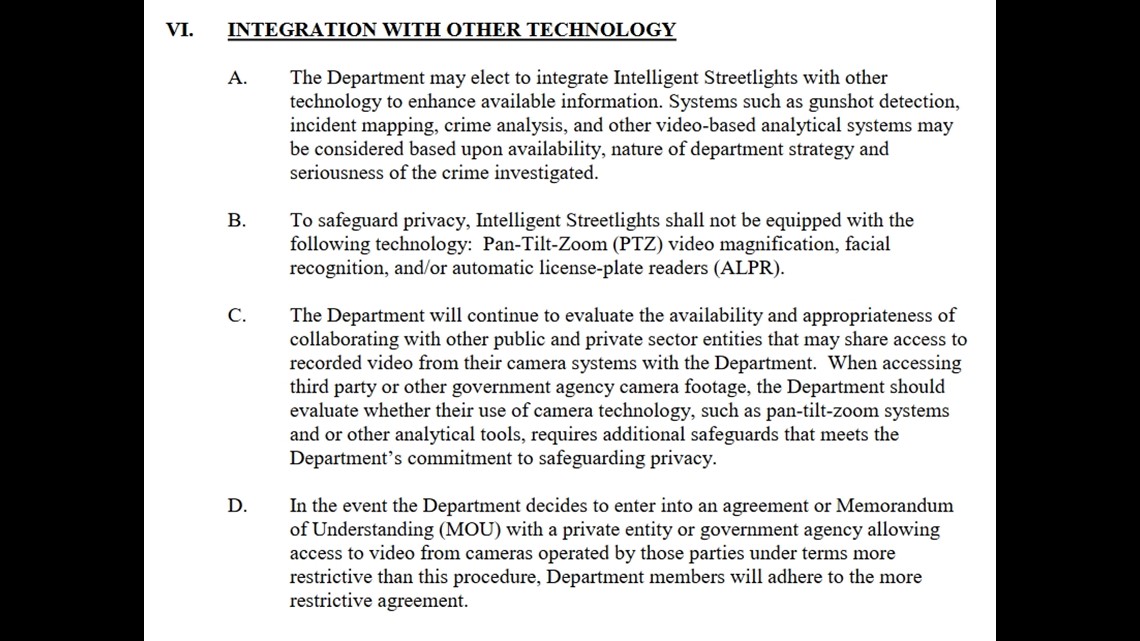
Response from the San Diego Police Department
San Diego Police Captain Jeffrey Jordon says the department has heard the community and developed its proposal with their concerns in mind. Jordon also says much has changed since the city launched its first attempt.
"The technology deployed previously, environment and oversight process have all changed in the past six years resulting in different conditions for considering ALPR technology integration in Smart Streetlights.
When the department procedure was created, smart streetlight technology was new to the city resulting in privacy concerns among community members. The concerns ultimately eroded the trust between the police department and the community. To stabilize trust and assure the community the Department would not add additional technology systems, the department drafted a policy prohibiting the integration of additional technology with what was at the time labeled a controversial addition to the city’s infrastructure."
Adds Jordon, "ALPR technology has made advancements more reliable and secure. Technology advancements, along with the passage of the Surveillance Ordinance, have created an opportunity to reintroduce technology to the community.
The Surveillance Ordinance, created by community members, provides an agreed-upon roadmap to community engagement and transparency, ensuring community voices have been heard and concerns addressed. The Department feels that working with the community to safeguard privacy during the deployment of evolving technology is the appropriate path forward in rebuilding trust and legitimacy with the community."
Jordon told CBS 8 that the 3,200 cameras currently affixed to city streetlights are no longer operational and will not be used. Jordon also said the city does have 1,000 unused cameras from the previous attempt and will look for ways to recoup the cost of those cameras.
San Diego's Public Safety Committee will discuss the new Smart Streetlight tomorrow, July 19, at 1 p.m.

